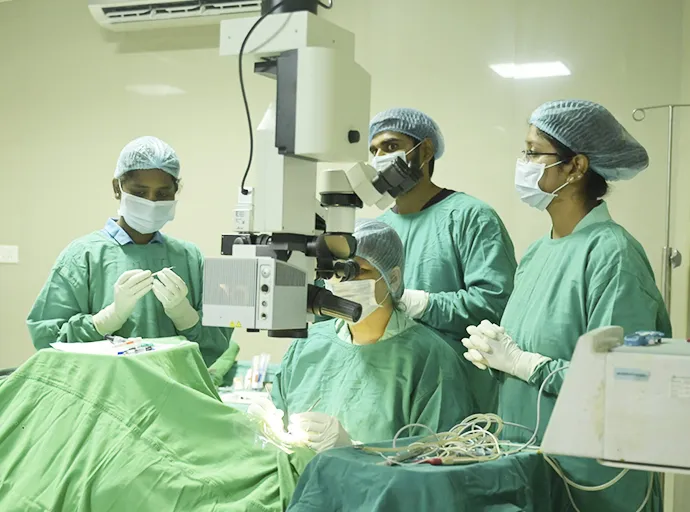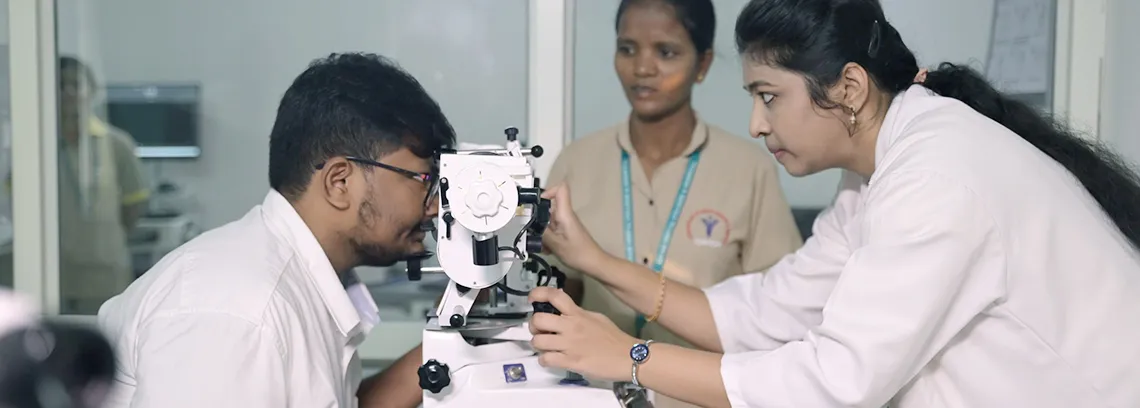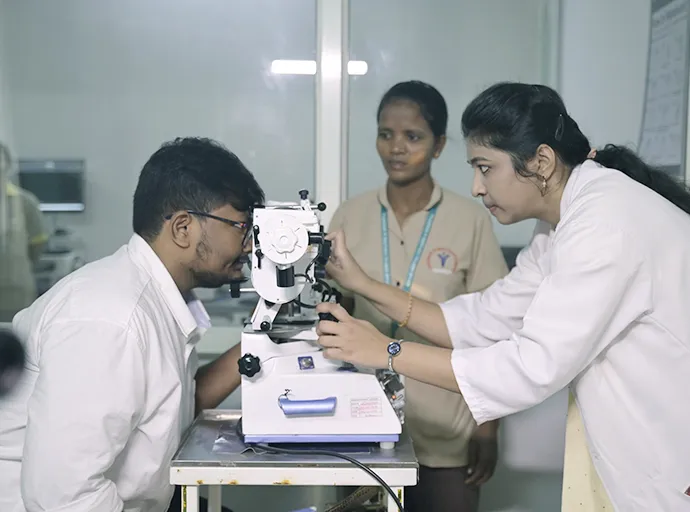MS (Ophthalmology)
The Master of Surgery in Ophthalmology provides an in-depth understanding of the anatomy, physiology, and diseases of the eye. This advanced postgraduate programme equips students with the clinical knowledge needed to diagnose, treat, and manage various ocular conditions. The curriculum extensively covers orbital and ocular anatomy, along with the histological aspects of eye tissues. It also delves into the physiological functions of the eye, providing a strong foundation in understanding how the eye works in health and disease.
In addition to anatomy and physiology, the MS Ophthalmology programme includes studies in ocular pathology, biochemistry, microbiology, and immunology. These subjects are essential for understanding the biochemical processes and immune responses associated with eye diseases. This comprehensive approach ensures that graduates are well-prepared for clinical practice, enabling them to provide specialised care for a wide range of eye disorders.

Eligibility
- A minimum of 60% aggregate marks in 10+2 with Physics, Chemistry, and Mathematics.
- Qualifying Exams: GAT (Engineering UG) 2024, JEE Main 2024, AP EAMCET/TS EAMCET 2024.
Scope of the Programme
Graduates of the MS Ophthalmology programme have diverse career opportunities in both private and public healthcare sectors. They can work as ophthalmologists in hospitals, eye care clinics, and specialised eye centres. Additionally, they can open their own private practices, providing comprehensive eye care services, including diagnosis, treatment, and surgeries for various eye conditions. Opportunities also exist in research institutions, non-governmental organisations focused on eye health, and educational roles in medical colleges.
In the public sector, graduates can join government hospitals or healthcare initiatives aimed at addressing widespread ophthalmic issues, such as cataracts and diabetic retinopathy, which are prevalent in India. They may also work in community health programmes that focus on preventive eye care and outreach services, contributing to reducing the national burden of blindness and visual impairment. With the growing demand for specialised eye care, MS Ophthalmology graduates can expect a wide range of career options to pursue.
Key Highlights
Application Domain Experience of Faculty
- Cardiology – Coronary Stents
- Nephrology – Hemodialysis
- Assisted Reproductive Centre
- Orthopaedics – Total Knee Replacement
- Anesthesiology – Pain Clinic
- ENT - Temporal Bone Dissection
Infrastructure
- 1.5 T High End Magnetic Resonance Imaging
- Modular Operation Theatres
- 128 Slice CT Scan
- RotaPro
- Optical Coherence Tomography
Areas of Excellence
- NABH (National Accreditation Board for Hospitals) Accredited Hospital
- Simulation-based Medical Education Unit
- Multi-Disciplinary Translational Research Centre
- Digital Anatomage Table
- Cardiology Catheterisation Lab
Practical Exposure
- Medical And Surgical Skills Laboratory
- Experiential Field Training
- Trans Disciplinary Electives
- Extentship Training
Hospitals & Academic Collaborations
- Basavatarakam Cancer Hospital
- Infosys Limited
- Silver Oaks Educational Society
- INS Kalinga
Institutional Social Responsibility
- Health Camps
- Health Awareness Activities
- Blood Donation Centre
Syllabus
Competency-Based Medical Education (CBME) as directed by the National Medical Commission.
Standard Track offerings of courses
- Physiology
- Microbiology
- Ophthalmology
- Anatomy
- Pathology
- ENT
- Biochemistry
- Pharmacology
- General Medicine
- Yoga and Meditation
- Forensic Medicine & Toxicology
- Community Medicine
- General Surgery & Orthopaedics
- Pediatrics
- Obstetrics & Gynecology
Key Topics Covered
- Orbital and ocular anatomy
- Optics
- Clinical Ophthalmology
Career Options
After completing an MS in Ophthalmology in India, graduates have a broad spectrum of career opportunities, especially given the increasing prevalence of eye diseases across the country. Conditions such as dry eye disease, diabetic retinopathy, and cataract-related blindness are on the rise, highlighting the growing need for specialised ophthalmic care. With diabetic retinopathy affecting around 12.3% of the population and dry eye symptoms being prevalent in over 6% of the population, ophthalmologists are in high demand to diagnose, treat, and manage these conditions. Graduates can pursue roles in public and private hospitals, eye care clinics, and specialised centres offering treatments for cataracts, glaucoma, and other vision-related issues.
In addition to clinical practice, MS Ophthalmology graduates can contribute to India's ongoing efforts to address blindness caused by cataracts, with nearly 49 lakh surgeries needed to address the backlog of blindness cases. They can also explore roles in medical research, contributing to studies aimed at improving eye care and developing new treatment methods.
With India’s elderly population projected to grow significantly by 2031, the demand for cataract surgeries and other age-related eye care services will continue to rise, creating ample opportunities for ophthalmologists to specialise in geriatric ophthalmology or work in government initiatives aimed at reducing visual impairment across the country. Additionally, graduates may work with NGOs or international health organisations focusing on eye health and blindness prevention.
Graduates from this programme can pursue careers in various sectors such as:
- ENT Specialist
- Lecturer/Professor
- Medical Consultant/Visiting Medical Consultant
- Ophthalmologist
- Product Specialist
- Senior Resident/Consultant
Infrastructure That Empowers Medical Excellence















Fee Structure
MS (Ophthalmology)
Scholarships
Merit-Based Scholarships
The scholarship from GAT/National/State Entrance Tests applies only in the first year. To continue receiving it in subsequent years, a minimum CGPA of 8.0 must be maintained.
Apart from the above, the following scholarships are also offered to eligible students.
- Employee Children Scholarships: (60%, 40%, and 20%)
- Loyalty Scholarships: (10% for Any alumni returning to do higher studies/Children of Alumni/Real siblings (Not applicable to step siblings or cousins)/Children of retired employees of GITAM/Spouse of GITAM employees).
- Sports Scholarships: (100%, 75%, 50%, 25% and 15%)
Need-Based Scholarships
- To be eligible for the need-based scholarship, the combined income of both parents/guardians of the eligible student/If the student is married, the combined income of the family, i.e., the student's and spouse's income, must be less than 12.00 LPA.
- The candidates admitted through merit scholarship in the slabs of 75%, 60%, 40%, 25%,and 15%, and the parents/guardians combined income is less than the prescribed limits are eligible for the additional need-based scholarship.
| Scholarship % | Upgraded Scholarship % |
|---|---|
| 75% | 100% |
| 60% | 75% |
| 40% | 60% |
| 25% | 40% |
| 15% | 25% |
Scholarships For Accommodation
- In addition, students awarded need-based scholarships after merit scholarships will receive an additional 20% scholarship specifically allocated for hostel fees at GITAM for slabs: 15%, 25%, 40%, and 60%.
- Students awarded 75% & 100% scholarships are also awarded the same percentage in the hostel and food charges.
Scholarship Percentage
100%
Eligibility for 2025
GAT 2025 Score >=141 <=200
GPAT Rank >=1 <=500
AP PGCET 2025 Marks >=110 <=120
TS CPGET 2025 Marks >=95 <=100
Scholarship Percentage
75%
Eligibility for 2025
GAT 2025 Score >=121 <=140
GPAT Rank >=501 <=1000
AP PGCET 2025 Marks >=100 <=109
TS CPGET 2025 Marks >=85 <=94
Scholarship Percentage
60%
Eligibility for 2025
GAT 2025 Score >=111 <=120
GPAT Rank >=1001 <=2000
AP PGCET 2025 Marks >=90 <=99
TS CPGET 2025 Marks >=80 <=84
Scholarship Percentage
40%
Eligibility for 2025
GAT 2025 Score >=101 <=110
GPAT Rank >=2001 <=3000
AP PGCET 2025 Marks >=80 <=89
TS CPGET 2025 Marks >=75 <=79
Scholarship Percentage
25%
Eligibility for 2025
GAT 2025 Score >=91 <=100
GPAT Rank >=3001 <=4000
AP PGCET 2025 Marks >=70 <=79
TS CPGET 2025 Marks >=65 <=74
Scholarship Percentage
15%
Eligibility for 2025
GAT 2025 Score >=81 <=90
GPAT Rank >=4001 <=6000
AP PGCET 2025 Marks >=55 <=69
TS CPGET 2025 Marks >=50 <=64








